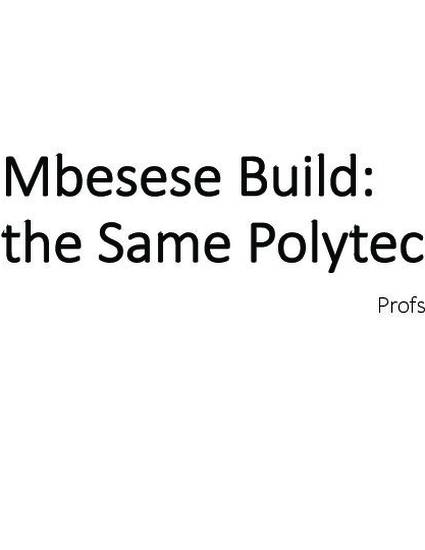
Presentation
Mbesese Build: An Experimental Experience (Same (Tanzania, Africa) Polytechnic College
Building Technology Educator's Society (BTES): Vol. 2019, Article 35
(2019)
Abstract
The Project
Communities in East Africa are in need of supplemental and diversified tertiary educational opportunities to increase humancapitalandreducetheseverelevels ofpovertythatareendemicintheregion.TheSame’PolytechnicCollege is a proposed vocational training institution to be established in the Kilimanjaro Region of the United Republic of Tanzania. The college is the pilot project ofa US registered charitable organization whose primary purpose is to improve quality of life for rural communities in East Africa. The non-profit has partnered with design firms and the students and faculty of The University to develop a framework around which the campus will develop. The objective is to plan for orderly campus growth by anticipating the essential programing and facility needs; and establishing overarching planning principles and design goals for buildings and related infrastructure required to support a projected enrollment of 1,200 students.
The project provided a platform for collaboration between faculty, students, professional engineers, and architects. The design of the campus encompasses architecture and planning, as well as, a variety of engineering disciplines such as mechanical, electrical, and subsets of civil engineering including structural, water, and transportation engineering. It was necessary for students to research an array of topics that are requisite to building a college, such as; energy usage and generation, water conservation and reclamation, natural ventilation and thermal comfort, natural day lighting and solar exposure, construction materials and structural systems, pedestrian and vehicular traffic patterns, as well as, site access and maintenance. The students then developed strategies for implementing the aforementioned concepts, while learning how those design issues are intertwined. During the design process the students held meetings and participated in workshops sponsored by the multi-disciplinary design firm that has completed projects in the African region.
The final master plan consists of a project brief which addresses; building layouts for housing, administration, and classrooms; design recommendations for solar and wind generation and energy farms; strategies for water collection and storage, principles of construction using indigenous materials and local technology; and rules for minimizing solar gains and maximizing natural ventilation. The recommendations are based on computational analysis and design, results from experiments conducted at The University, and valuable feedback from the design professionals.
The Test: Building a Micro Structure
In summer 2018, students, faculty, and volunteers travelled to Tanzania and constructed a micro structure based on the design recommendation included in the master plan, and based on experimental studies conducted at The University. The research, such as block wall testing, wind tunnel/natural ventilation studies, and a thermal comfort/CFD study, helped inform the design and construction of the micro structure as shown on the next page. It was the initial trip that involved construction of a building and allowed the team to better understand the cultural, environmental, and physical considerations that accompany designing and building in developing areas.
The Proposition:
The paper will expand upon the lessons learned while building in Tanzania – how cultural, technological, and environmental concerns influence design in developing countries. But the influence of current research at the University and how it shapes the design strategies will also be discussed. The linkage between experimental research, design, and construction is a hallmark for the project and has served as a selling point for instituting change in building practices in the rural town where the project is being constructed.
Keywords
- Interdisciplinary Collaboration,
- Design Build
Disciplines
Publication Date
Summer June, 2019
Location
University of Massachusetts / Amhurst, Massachusetts
Citation Information
Thomas Fowler and Kevin Dong. "Mbesese Build: An Experimental Experience (Same (Tanzania, Africa) Polytechnic College" Building Technology Educator's Society (BTES): Vol. 2019, Article 35 (2019) Available at: http://works.bepress.com/tfowler/18/
